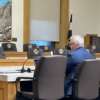“Cardboard Cory: the Documentary” tells the incredible story about the life and times of a cardboard cutout of Republican Sen. Cory Gardner and the political activists behind the cardboard.
There’s a perception out there of activists as lonely, angry people who you try to slide away from at parties. This film does a beautiful job of debunking that stereotype, showing that activism and activists are about community-building and fun.
But the 15-minute film is also an organizing tool.
And it’s the organizing-tool part that really excites the folks who are promoting the film and want more than anything to see Gardner exit the U.S. Senate.
“We’re fewer than 100 days out from the election. To win in 2020, we need to work together to save our future,” says Katie Farnan, of Indivisible Front Range Resistance (IFFR), which created the cutout along with other local indivisible groups. “The Cardboard Cory documentary inspires us to celebrate our movement’s leaders and past victories and then get to work on the election of our lifetimes.”
The documentary’s release “party” on Tuesday was actually less of a party and more of an action step, timed with Indivisible’s Unity Week of Action, which began Monday.
“After watching the film, viewers were given the tools to call voters directly as well as resources for doing more electoral work in the 97 days remaining in the 2020 election cycle,” stated a news release about the documentary that was headlined, “Viewers make commitment to motivate voters as part of a week of national electoral action.”
But please take a 15-minute break from political organizing and watch this film by Nick Rosen and paid for by the Payback Project, which is Indivisible’s national campaign focused on 11 vulnerable senators.
It opens with MSNBC host Rachel Maddow saying Gardner’s “constituents have not seen much of him,” noting that at the time the senator hadn’t held a town hall meeting in “486 days, seven hours, ane 20 minutes, not that they are counting or anything.”
The film soon cuts to Farnan, who talks about how she used to be “like a lot of people,” concerned about politics but busy.
“I was on the sidelines,” says Farnan in the film. “And then Trump happens.”
Farnan, a librarian, felt helpless about stopping Trump, so she started researching Trump’s backers.
“And I came across this guy, Cory Gardner. And I’m like, ‘Hey, that’s my senator.”
The film runs through Gardner’s slick dance (literally) and advertisements portraying him as a moderate. And contrasts this with his focus on special interests, like the NRA and big pharma, and extreme support for Trump.
Farnan was looking forward to facing Gardner at a town hall meeting. But no town hall was forthcoming.
So, in 2017 as the film tells the story, she and other activists organized their own town hall, which marked the debut of Cardboard Cory. Over 1,500 people packed a Denver middle school and asked Gardner the questions they wanted to ask the actual senator.
From there, the cut-out hit the road, carried under the arms of activsts from event to event–and was even driven across Colorado on a bus. Local TV news footage and other amusing video clips in the film show folks talking to the cutout.
The big-headed cutout is seen leaning against trees, in an airport, on the street, standing silently as folks talk to him.
What’s great is, the cut-out is always smiling, even if the people around it aren’t. It’s not a good look for Gardner, the cutout or the real one.
The end of the film depicts a side of activism that more people need to see, as the organizers who’ve promoted the cutout, including Farnan, talk about how much fun they’ve had together, as they’ve sounded the alarm about Gardner.
“We are a family,” says one organizer. “We get stuff done together and we keep moving.”
Farnan says she hopes to retire Cardboard Cory in November, but you get the sense that the movement that produced the famous soft wood product will live on regardless. That’s what the film is about.




